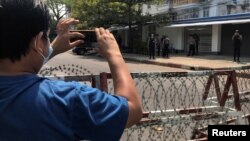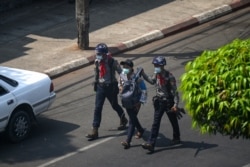Myanmar's military council has amended the country's broadcasting law in a move that rights groups and lawyers say will further restrict the media.
The changes, passed Monday, relate to several sections of an existing law passed by Myanmar's quasi-civilian government in 2015.
That law applied only to radio and television, but the military council expanded the remit to include "any other technology" that people use to access radio and TV broadcasts.
The changes could extend to people uploading content to news websites, Facebook, YouTube and other social media sites, the rights groups Free Expression Myanmar said in a statement.
The changes are broad, applying to anyone broadcasting without a license issued by Myanmar. This has the potential to impact a range of outlets, including those running unofficial radio networks or even foreign media operations such as BBC Burmese, the group said.
The military council increased penalties to include prison time for violations such as broadcasting without a license, including via the internet; reporting after a license has been revoked; and attempting to secure multiple licenses.
The amendments "severely punish the media" said Min Lwin Oo, a human rights lawyer based in Norway.
"In the past, only fines were imposed. The amended law's punishment ranges from three to five years in prison," Min Lwin Oo told VOA Burmese.
The changes alter Myanmar's first broadcasting law. Passed in 2015, it was seen as a step to opening up the private media sector. The law offered five types of broadcast licenses and established an independent supervisory council.
But the changes made by the junta Monday add to an increasingly restrictive media environment. Since seizing power in a February 1 coup, Myanmar's military has revoked the licenses of at least nine news outlets and arrested dozens of journalists. The crackdown has forced many news outlets to change how they operate or to work from hiding or self-imposed exile.
The situation facing Myanmar's media was raised by the United Nations at a Tuesday briefing.
Farhan Haq, a spokesperson for the U.N. secretary-general, said UNESCO continues to voice its concern over the "restrictive policies and practices by the military authorities."
"Threats of violence and attacks against journalists in Myanmar have created a climate of fear for media professionals, impeding the free circulation of information, opinion and ideas," Haq said.
Since the February 1 coup, at least 126 journalists have been arrested and 47 remain in custody. News outlets are also under pressure, with 20 independent stations suspending operations, and raids carried out against nine media companies, Haq said.
The military announced an amnesty last month for thousands of people detained since February. However, several journalists named on the release list, including veteran journalist Sithu Aung Myint, who contributes to VOA, remain in custody. Sithu Aung Myint has been detained since August 15.
Nathan Maung, an American journalist of Burmese descent who spent 98 days in a Myanmar prison, said the military is amending laws as it pleases.
Under civilian rule, the drafting of new laws would often include consultation with a committee of lawmakers and ministry officials or provisions for a regulatory body, as under the 2015 broadcasting act. But under the junta, "there are no rules and regulations," Maung said. And authorities have not said whether a broadcasting council will be formed to mediate complaints.
Maung and his colleagues were arrested in March, when authorities raided the offices of independent news website Kamayut Media, where he was editor in chief. In an interview with VOA in June, the journalist recalled the harsh interrogation he was subjected to and his fears for colleagues still detained.
In the U.N. media briefing this week, Haq called on the military to release all those detained under the coup, including journalists.
This story originated in VOA's Burmese Service.







